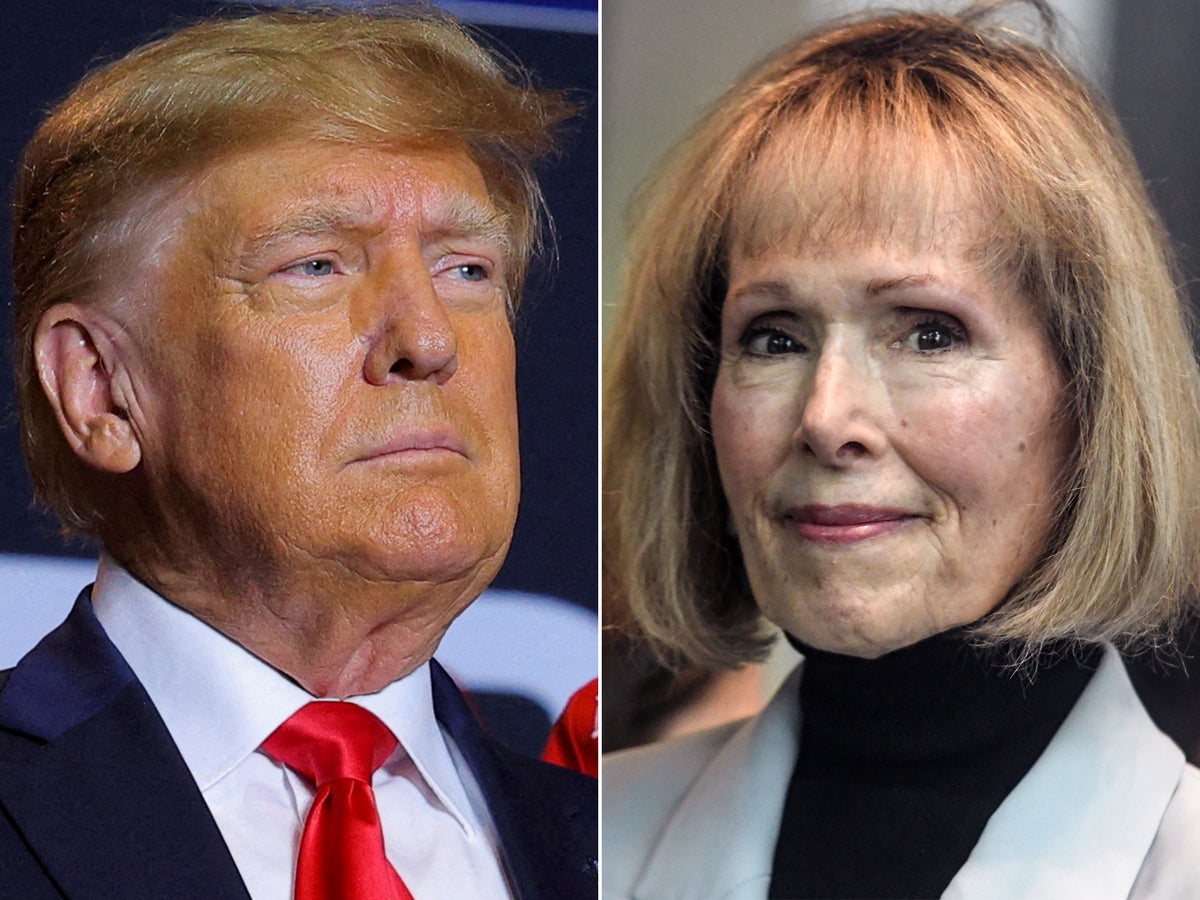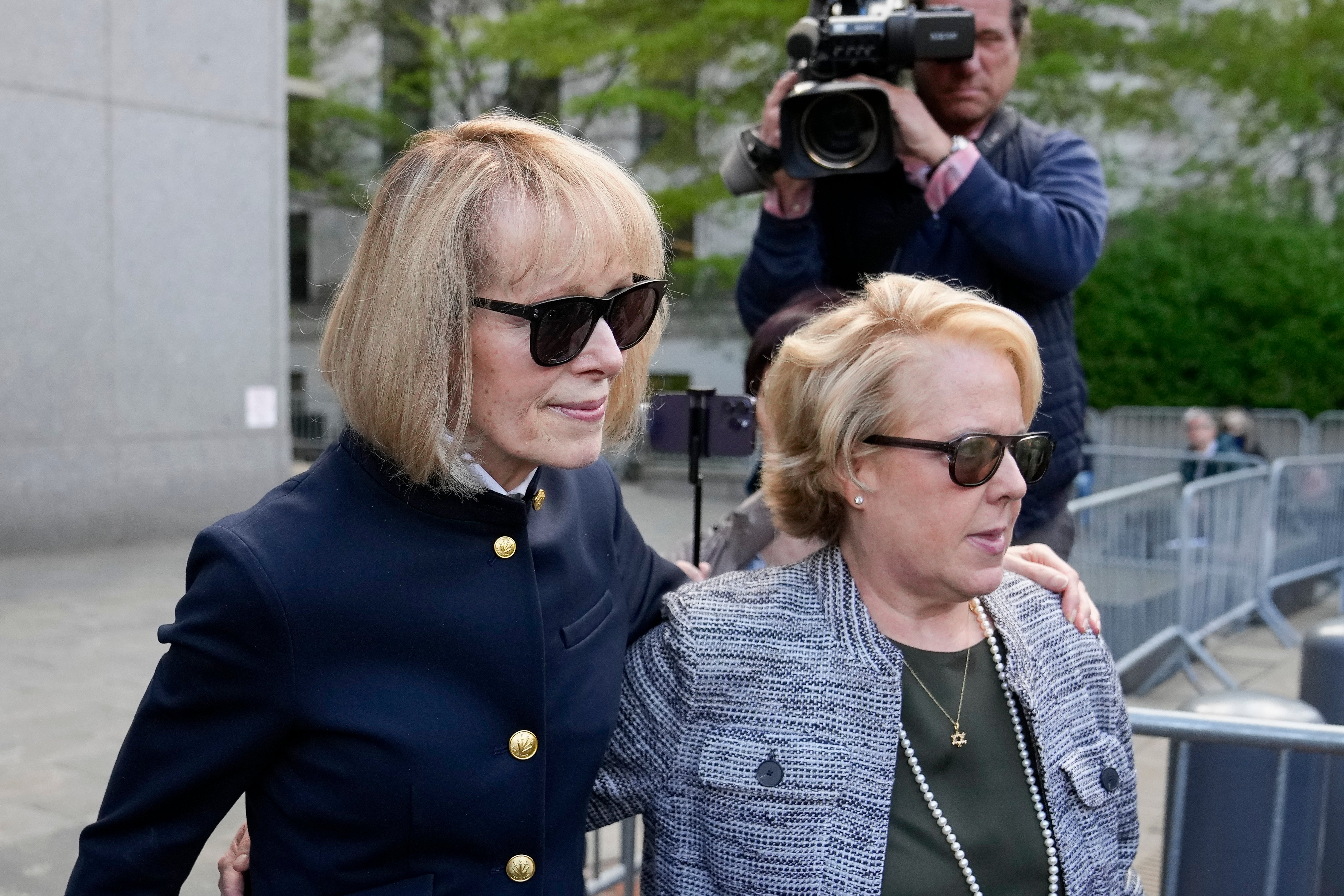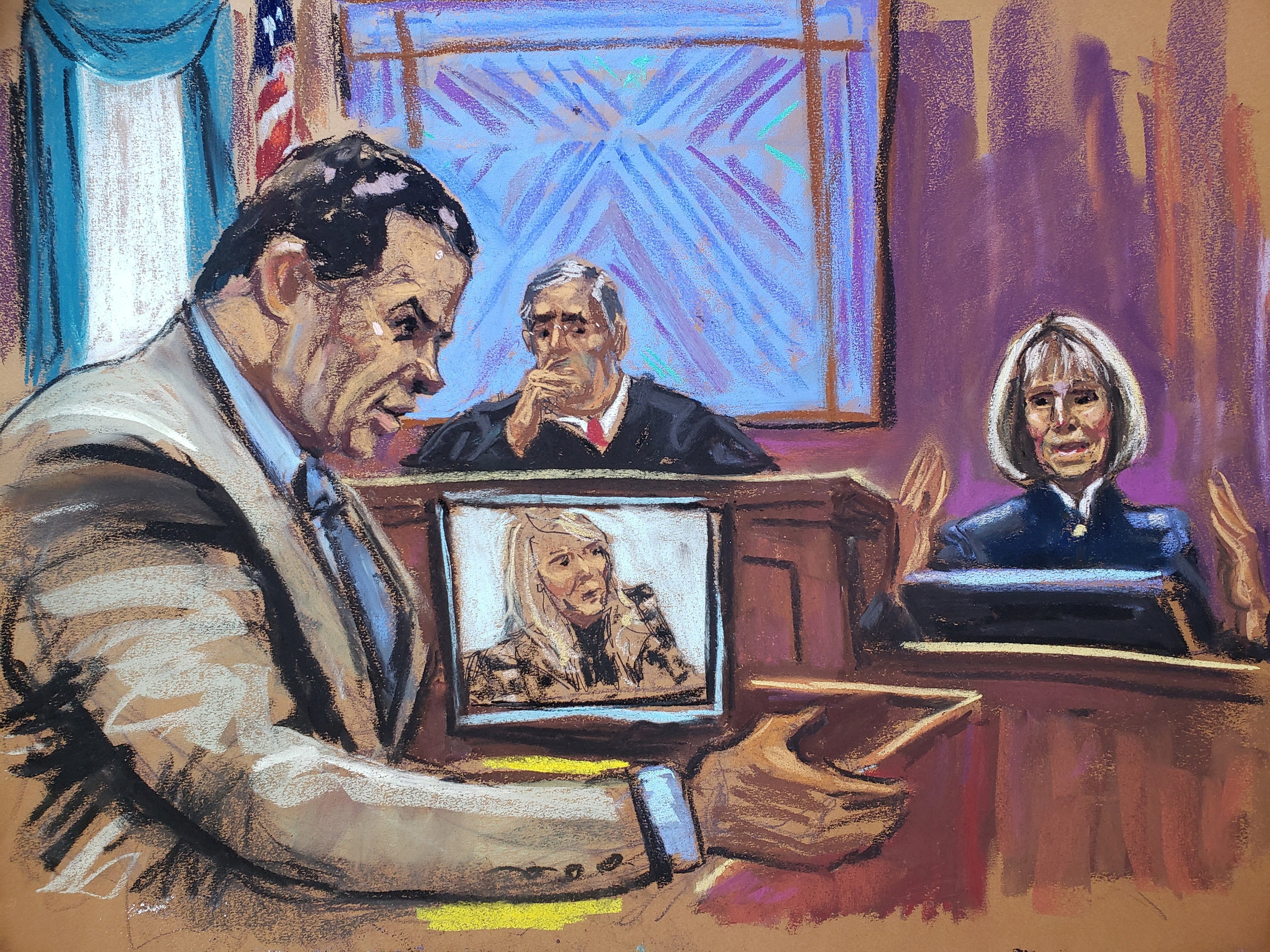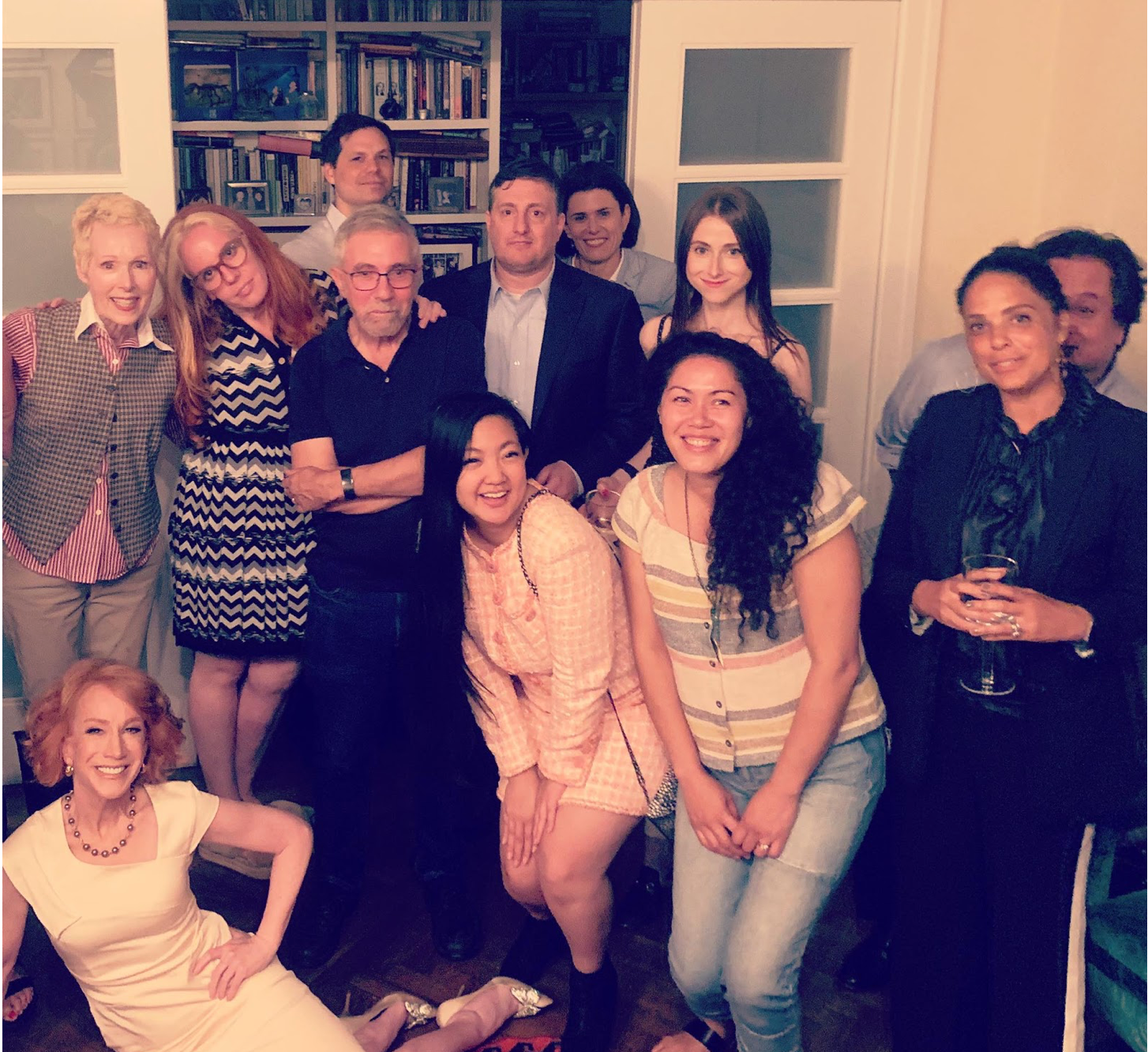
E Jean Carroll withstood a barrage of intensely personal questions and inflammatory accusations during more than 13 hours on the witness stand in her civil battery and defamation trial against former president Donald Trump.
The former Elle advice columnist was quizzed about years of emails, text messages, deposition statements, articles and social media posts by Mr Trump’s attorney Joe Tacopina as he tried to sow doubt in the minds of the nine jurors.
On 9 May, the jury in the civil case returned a verdict that Mr Trump was liable for sexually abusing Ms Carroll, but not raping her, and awarded the writer a total of $5m in damages, which includes the defamation claim.
In the courtroom, the clerk read the verdict: “As to battery, did Ms Carroll prove that Mr Trump raped Ms Carroll?” The jury answered “No”.
The jury also found Mr Trump liable for wonton disregard, for which Ms Carroll was awarded $20,000, according to Inner City Press.
Mr Trump was also found liable for defamation as the jury found that he made false statements about Ms Carroll.
The jury found that Mr Trump acted with actual malice and that Ms Carroll had been injured, for which she was awarded $1m. For repairing her reputation, Ms Carroll was awarded $1.7m.
Ms Carroll, 79, remained stoic for most of her marathon testimony. She was at times funny, defiant, and emotional as she was forced to recall the traumatic alleged sexual assault that happened nearly three decades earlier in a Bergdorf Goodman dressing room in Manhattan in 1996.
Entering the witness box on day two of the trial on Wednesday 26 April, she began by saying: “I’m here because Donald Trump raped me, and when I wrote about it he said it didn’t happen. He lied and shattered my reputation, and I’m here to try to get my life back.”
Ms Carroll is suing the former president in civil court for defamation and battery after he claimed she was a “con job”. Mr Trump, 76, has strongly denied the encounter ever took place.
Here are six memorable moments from Ms Carroll’s testimony.
‘I was amazed that a woman would be asked that in 2023’
Ms Carroll testified that she and Mr Trump had engaged in lighthearted banter as they wandered through a deserted 6th floor of the luxury Manhattan department store Bergdorf Goodman one spring evening in 1996.
That changed in an instant when he allegedly shoved her up against a wall on one of the dressing rooms, she said.
Still uncertain what was happening, Ms Carroll told the court she laughed at the real estate tycoon as a way to defuse the situation.
As the alleged sexual assault continued, Ms Carroll said she was filled with adrenaline as she pushed and kicked back against the much larger man.

Under cross-examination from Mr Tacopina on Thursday 27 April, the former Elle advice columnist was repeatedly asked why she hadn’t screamed during the assault.
“I was in too much of a panic to scream, I was fighting,” she said.
When Mr Tacopina pressed again, she replied: “You can’t beat up on me for not screaming. One of the reasons why women don’t come forward is they are asked ‘why didn’t you scream’. It keeps women silent.”
Judge Lewis Kaplan eventually grew impatient with the defence attorney’s questions.
“It’s argumentative, it’s repetitive and it’s inappropriate,” Judge Kaplan said during one of several scoldings.
Under questioning from her attorney Mike Ferrara, Ms Carroll said: “I was amazed that a woman would be asked that in 2023.”
Law & Order parallel plot lines
Seeking to undermine Ms Carroll’s allegations, Mr Tacopina questioned her about a 2012 episode of Law & Order: Special Victims Unit on the third day of testimony on Monday 1 May.
Titled “Theatre Tricks,” the episode’s plotline depicts a male character who fantasises about bursting in on a woman trying on lingerie in a dressing room of the Bergdorf Goodman department store, the jury was told.
Mr Tacopina showed the jury a 2019 email sent to Ms Carroll by her friend Grace Brophy weeks after she went public with the allegations in New York magazine. Ms Brophy warned the writer that “Trumpsters will use this against you”.
Ms Carroll replied to her friend that she hadn’t seen the episode, but was only surprised that “this sort of plot is not seen more often”.
Ms Carroll testified that she was a “big fan” of Law & Order, but didn’t like the SVU spinoff as it was too violent.

Asked by Mr Tacopina why she wasn’t surprised at the similarities, she told the court that the crime drama was “very good at keying into the psyche of their viewers”.
“That was amazing to me,” she said when she learned about the episode.
Mr Tacopina appeared incredulous, and asked if she meant it was an “amazing coincidence”.
“Astonishing,” she shot back.
Questioned later by her attorney Mr Ferrara, Ms Carroll said she had never seen the episode or heard about it prior to 2019.
“Are you making up your accusation based on what happened in a popular TV show?” he asked.
“No,” she replied.
‘Wave of slime’
Under questioning from her attorney Mr Ferrara on Thursday 27 April, Ms Carroll told how she would be inundated with a “wave of slime” every time Mr Trump commented or posted about her allegations.
“It’s very hard to get up in the morning and receive those messages, that you are way too ugly to go on living,” she said.
Ms Carroll said she had “peeked” at Twitter prior to coming to court on that morning, and was met with a familiar stream of abusive and threatening messages.
“There it was again, the onslaught,” she said. “It’s not a great way to start the day.”
Ms Carroll added: “I like attention, there is no question. I don’t like attention because I’m suing Donald Trump, getting attention for being raped is hard.”
The court was given a sample of the vulgar messages sent to Ms Carroll by supporters of the former president.
After the allegations were first made in a book excerpt in New York magazine in June 2019, Mr Trump angrily denied it in an official White House statement.

Mr Trump repeated the denials days later in an Oval Office interview with The Hill, saying: “Number one, she’s not my type. Number two, it never happened. It never happened, OK?”
Ms Carroll testified that “not my type”, had meant she was “too ugly” to be sexually assaulted.
Ms Carroll filed a defamation lawsuit against Mr Trump alleging he had damaged her reputation, substantially harmed her professionally, and caused emotional pain.
She filed a second suit for battery and defamation after Mr Trump posted defamatory statements in October 2022 where he called her a “complete con job”.
Ms Carroll said fear of reprisals from Mr Trump was a significant factor in remaining silent over so many years.
“I was afraid that Donald Trump would retaliate, which is exactly what he did,” she said. “My biggest fears came absolutely true.”
MeToo and Harvey Weinstein
Ms Carroll told the court that when she began work on her memoir, she hadn’t intended to write about the alleged assault by Mr Trump.
Seeking inspiration, she took a “feminist road trip” across the United States in 2017 seeking to answer the question: “What do we need men for?”
Around the same time, sexual assault allegations against the disgraced filmmaker Harvey Weinstein became public during the initial wave of the MeToo movement. She decided she couldn’t remain silent any longer.
“I was not a pioneer, I am a follower,” she said during cross-examination on Thursday 27 April. “I saw other women coming forward after Harvey Weinstein and I thought, ‘Who am I to stay silent’. Also, I was 78 or 79, I had been silent for too long.”
In her book What Do We Need Men For? A Modest Proposal, Ms Carroll also alleged she had been sexually assaulted by the disgraced former CBS CEO and president Les Moonves.
In a heated exchange with Mr Tacopina, Ms Carroll said that she had not sued Mr Moonves for defamation because he had simply denied the claim: “He didn’t call me names, he didn’t grind my face into the mud like Donald Trump did.”
George Conway
Ms Carroll was questioned in court about how she had come to the decision to sue Mr Trump.
She testified that she had been asked in interviews by several journalists whether she was planning to pursue legal action against the then-president.
The idea had “crystalised” during a conversation with George Conway, the constitutional legal expert, at a party at author Molly Jong-Fast’s home in 2019, she said.
The event, attended by Kathy Griffin, former Hillary Clinton aide Philippe Reines, and broadcaster Soledad O’Brien, was described in The New York Times as “Resistance Twitter come to life”.

Mr Trump’s attorneys have attempted to portray Ms Carroll as being motivated by a staunch anti-Trump political ideology.
Asked about the meeting for a second time under cross-examination, Ms Carroll said that Mr Conway had talked her through the differences between a civil and criminal trial.
He had also recommended famed civil rights attorney Roberta Kaplan to her as legal counsel. She testified that two days after the party, she retained Ms Kaplan.
Mr Conway, who is divorcing Mr Trump’s former senior White House counsel Kellyanne Conway, emerged as one of the former president’s leading critics during his term in office. He also had a major hand in the impeachment of another former president, Bill Clinton.
In 2018, Mr Conway told Yahoo News how he helped bring the Monica Lewinsky scandal to light after being outraged at the Democratic president’s sexual misconduct while in office in the 1990s.
He wrote anonymous legal briefs for the attorneys of Paula Jones, a former Arkansas state employee who accused Mr Clinton of sexual harassment, which contributed to his impeachment for “high crimes and misdemeanours” in 1998.
Incapable of finding love
Ms Carroll described how she had led a dual existence since the alleged 1996 rape.
There was her public persona, as a confident, successful Ask E Jean advice columnist, author and television presenter. And then there was the private E Jean who “can’t admit out loud that there has been any suffering”, she said during testimony.
She had publicly brushed off the 1996 encounter with Mr Trump as not having caused her any lasting damage.
Ms Carroll would write in her 2019 memoir that she suffered “very little” from the alleged assault. She explained in court that was her “invincible” public self, never wanting to admit weakness.
If she ever received a message from a reader who had been sexually assaulted, Ms Carroll said she would always advise them to go to the police and see a therapist.
But she admitted she had not taken her own advice on board, and the alleged sexual assault had caused her to privately suffer waves of crippling anxiety attacks and left her incapable of forming relationships, she said.
She testified that she has not had a romantic partner since the alleged assault.







